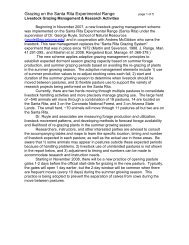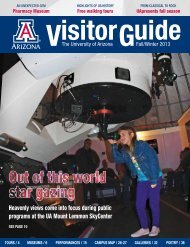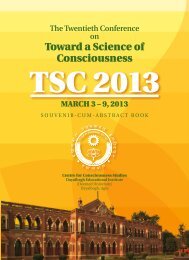CONSCIOUSNESS
Download - Center for Consciousness Studies - University of Arizona
Download - Center for Consciousness Studies - University of Arizona
- No tags were found...
You also want an ePaper? Increase the reach of your titles
YUMPU automatically turns print PDFs into web optimized ePapers that Google loves.
1. Philosophy 83<br />
of thought and language, it is clear that my conscious states are sufficient to make it the case<br />
that I mean plus rather than quus by ‘+’. Kripke also gives us strong reasons to think that the<br />
physical workings of my body and brain can’t determine that I mean plus rather than quus<br />
by ‘+’. In the light of these considerations, I offer the following rule-following argument<br />
against physicalism: (i) If Mary only knows that physical facts about me, then she won’t know<br />
whether I mean plus of quus by ‘+’, (ii) Once she learns about my conscious states, Mary<br />
knows that I mean plus rather than quus by ‘+’, (iii) Therefore, the facts about my conscious<br />
states are not physical facts. C1<br />
86 Phenomenal Externalism and Self-Knowledge Amir Horowitz <br />
(History, Philosophy and Judaic, The Open University of Israel, Ra’anana, Israel)<br />
Semantic externalism has been charged for not respecting the a poriori nature of self<br />
knowledge. Specifically, it has been argued that it is a consequence of externalism that one<br />
can distinguish a priori between the content of one’s beliefs and all other possible contents,<br />
but that externalism entails that one cannot distinguish one’s water-beliefs (beliefs about H2O<br />
samples) and one’s twater-beliefs (beliefs about XYZ samples). An extension of this charge<br />
applies to phenomenal externalism. In this talk, a new way for defending semantic externalism<br />
from that charges is suggested, and then it is applied to the respective charge against<br />
phenomenal externalism. Central to the suggested solution is the “quotation principle”: that<br />
if one has the belief one would express by “I believe that P”, one would normally have the<br />
second-order belief one would express by “I believe that I believe that P”. It is argued that<br />
the resolution of our a priori knowledge of our beliefs is no greater than the resolution that is<br />
embodied by the quotation principle, and that this is true also on the assumption that contents<br />
are externally determined. Thus, the resolution of our second-order beliefs vis a vis our firstorder<br />
beliefs on the assumption that their contents are externally determined is identical to<br />
the resolution that it makes sense to attribute to our knowledge of our beliefs independently<br />
of any assumption about content-determination, and semantic externalism can rebuff the attack<br />
from self-knowledge. Phenomenal externalism comes in two varieties. The first simply<br />
follows from the conjunction of semantic exeternalism and the representational theory of<br />
phenomenality (or any theory according to which representational content plays a role in<br />
the determination of phenomenal character). Phenomenal externalism of this variety faces a<br />
challenge that is identical to the one that semantic externalism faces and can be treated in the<br />
same way. Phenomenal externalism of the second, stronger, variety is the view that the object<br />
of a perceptual state plays a constitutive role in the state’s phenomenal character, so one’s veridical<br />
perception and one’s related hallucination necessarily differ in phenomenal character.<br />
This variety of phenomenal externalism faces a challenge that is different, although related, to<br />
the previous one, a challenge that concerns one’s ability to distinguish a priori between one’s<br />
veridical perception and one’s related hallucination. It is shown how the suggested solution to<br />
the challenge for semantic externalism can be applied to this challenge as well. P1<br />
87 The Reflexive Nature of Consciousness and Anti-Individualism Bernard W. Kobes<br />
(Philosophy, Arizona State University, Tempe, AZ)<br />
Tyler Burge, in Foundations of Mind (2007), argues that phenomenal consciousness is,<br />
in a certain sense, reflexive: sensation x (of e.g. color, pain, or visual blur) is present in phenomenal<br />
consciousness to subject S through x itself. For Burge this is one species of a generic<br />
3-place relation: x is present to subject S through mode of presentation m. Phenomenal<br />
consciousness involves a species of this generic relation in which the first and third relata are<br />
identical. Burge restricts his discussion to cases in which reflexive modes of presentation are<br />
individualistically individuated. I consider an extension of the theory in which intentional<br />
contents may be rational-access conscious in virtue of externally individuated reflexive modes<br />
of presentation. C1







